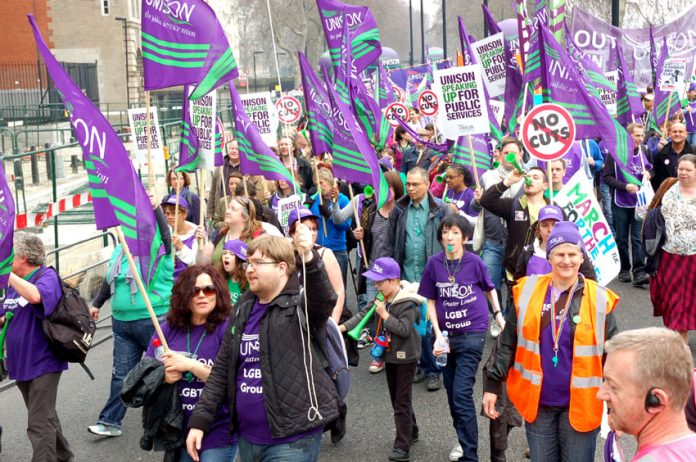
The Unison national delegate conference in Manchester yesterday voted to step up the fight to save the NHS and to call a national demonstration.
Delegates voted unanimously for Composite D, ‘Our NHS Our Future’, which warns the Health and Social Care Bill ‘will render the NHS unrecognisable’.
It commits Unison to ‘continue campaigning in the strongest possible terms against government proposals that will lead to the break up of the NHS as we know it’.
Delegates voted for Amendment D1 to strengthen the composite, which commits the Unison NEC to ‘work with other unions and campaigning organisations to organise a national demonstration and mass lobby of Parliament in defence of the NHS’.
‘The future of the NHS is at stake,’ said delegates yesterday morning, and pledged to ‘make sure this is a fight we win’.
Moving the composite, James Anthony for the national executive committee declared: ‘We’ve retoxified the NHS as an issue for the Tories.’
He urged activists to take action on the NHS’s birthday on July 5th.
In a passionate debate, Pat Barrett of the national retired members committee told the hall: ‘A lot of us can remember, if you didn’t have one and sixpence, you couldn’t see a doctor. Imagine that if you’ve got a poorly kiddie.’
She urged branches to use retired members in the fight, saying: ‘We can help. We’ve still got fire in our bellies.’
Clare Williams for the NEC stressed that the government had no mandate for the ‘wholesale dismantling of the NHS’.
She warned that ‘the NHS remains the largest untapped market in Europe’, which was why the government wanted to privatise it for their friends in big business – friends such as ‘Care UK, which funded Andrew Lansley’s campaign’.
Diane Kelly from the North West also stressed that neither the Tory nor LibDem manifesto had contained the changes now being proposed to the NHS.
Conroy Lawrence of London highlighted the ‘very real risk to people’s lives’ of the plans, adding it was important to ‘engage with the public’ on the issue.
Speakers told conference about cuts that were already happening, about waiting lists that were growing and about how surgery such as hip and knee replacements, and cataract operations was being declared ‘non-essential’.
Debbie Turner of central Lancashire stressed that, in the fight for the NHS, ‘nothing is more important than constant, strategic local action’.
Amid a raft of measures, the composite called on the NEC to:
• continue to make the case for a universal, comprehensive and equitable NHS that focuses on patients and not profit;
• work to expose the lie that NHS spending is protected and highlight the impact of cuts on health staff and patient services across the UK;
• build alliances and work with community groups, local councils and the Labour Party to fight the privatisation of the NHS.
Delegates also voted for Motion 2 Organising. In the debate, striking Southampton hospital cleaners leader Jo Spear was greeted with applause.
She said: ‘I’ve been on strike for seven days last week against my employer Compass Medirest.
‘Through the three companies project we won a wage rise, sick pay, more holidays and respect. We are now striking for our back pay.’